All rights reserved. Published 2016.
The University of Chicago Press gratefully acknowledges the generous support of the Judaic Studies Program at Yale University toward the publication of this book.
Names: Samuels, Maurice, author.
Title: The right to difference : French universalism and the Jews / Maurice Samuels.
Description: Chicago ; London : The University of Chicago Press, 2016. | Includes bibliographical references and index.
Identifiers: LCCN 2016011295 | ISBN 9780226397054 (cloth : alk. paper) | ISBN 9780226399324 (e-book)
Subjects: LCSH : JewsFranceSocial conditions. | AntisemitismFrance. | Jews in literature.
Classification: LCC DS 135. F 83 S 25 2016 | DDC 305.892/4044dc23 LC record available at http://lccn.loc.gov/2016011295
I could not have completed this book without the aid of many friends and colleagues, as well as the support of a number of institutions. It is a pleasure to have the chance to thank them here.
My thanks go first to the John Simon Guggenheim Foundation for enabling me to take a year away from teaching to complete this book. I am extremely grateful to Yale University for believing in humanities research and providing the resources to make it possible. Yales Program in Judaic Studies generously offered a publication subvention. Librarians in France and the United States, especially at the Bibliothque nationale de France and Yale University, have been extraordinarily helpful. I also thank all the institutions at which I had the opportunity to present this material; feedback from colleagues and students at these talks has proven invaluable.
Alan Thomas at the University of Chicago Press has been an inspiring and judicious editor. Two extremely knowledgeable anonymous readers gave detailed feedback on the manuscript, and the book is far better for their effort. Randolph Petilos, Perry Cartwright, and the rest of the staff at the Press shepherded the book through production with skill and care. India Cooper did a superb job copyediting the manuscript.
I have dedicated this book to my teachers, and these include Naomi Schor, who was working on French universalism when she died and whose insights have shaped my thinking in profound ways. Susan Suleiman has been an intellectual role model since I was an undergraduate. She contributed to this project all along the way but was never more helpful than at the last minute, when she convinced me that I needed a better title. Jann Matlock has been a generous mentor, a salient critic, and a valued friend for two decades.
I am extremely fortunate to work with colleagues I not only esteem but genuinely like. Alice Kaplan introduced me to her editor and gave copious feedback on numerous drafts of this book. She has been ingeniously supportive on a daily basis and has made work a pleasure. Francesca Trivellato read large sections of the manuscript and has been generous with her insight and friendship. Howard Bloch and David Sorkin provided valuable feedback on individual chapters. Carolyn Dean has been an especially cherished interlocutor. Im also very grateful to current and former colleagues at Yale who have contributed to this project in different ways: Bruno Cabanes, Steven Fraade, Tamar Gendler, Hannan Hever, Amy Hungerford, Paula Hyman, Kathryn Lofton, Ivan Marcus, Maria Menocal, John Merriman, Christopher Miller, Mary Miller, Hindy Najman, James Ponet, Steven Smith, and Elli Stern. I have taught this material in several undergraduate seminars and learned much from my students. Clmentine Faur-Bellache and Colin Foss were always willing to lend research assistance. Agnes Bolton, Inessa Laskova, and Renee Reed provided expert administrative support.
As someone who works on the border between French and Jewish studies, I am very lucky to have met smart and generous colleagues in both disciplines. I extend my thanks to Phyllis Albert, Emily Apter, Lia Brozgal, David F. Bell, Dorian Bell, Pierre Birnbaum, Marc Caplan, Vincent Debaene, David Feldman, Jonathan Hess, Deborah Jenson, Jonathan Judaken, Ethan Katz, Sara Kippur, Elisabeth Ladenson, Lisa Leff, Bettina Lerner, Maud Mandel, Rachel Mesch, Philippe Met, Sven-Erik Rose, Alvin Rosenfeld, Henry Rousso, Debarati Sanyal, Ronald Schechter, Alyssa Sepinwall, Andrew Sobanet, Jonathan Strauss, Patrick Weil, Nicolas Weill, Liliane Weissberg, Nicholas White, and Robert Wistrich. Rachel Brownstein, Bruno Chaouat, Dan Edelstein, Steven Englund, and Julie Kalman provided smart comments on different parts of the manuscript. Peter Brooks, Franoise Lionnet, and Aron Rodrigue lent incredibly valuable support. Elisabeth Hodges, Jennifer Siegel, Jacob Soll, and Caroline Weber have shared the ups and downs of this project over the years, and Im very thankful for their friendship. Olga Borovaya and Lawrence Kritzman also went above and beyond the call of duty.
Ghita Schwarz and Elliot Thomson are not only the best of friends but also the best of editors, and I can never thank them enough for all their help. My other nonacademic friends have been constantly supportive, and while I cant thank all of them here, I do want to single out a few who helped this project along in specific ways: Elisabeth Franck, David Geller, Ethan Herschenfeld, Valerie Steiker, Laura van Straaten, and Gillian Thomas. My family, especially Richard and Barbara Samuels, continue to make everything possible.
*
A portion of will appear in Revisioning French Culture, edited by Andrew Sobanet (Liverpool: University of Liverpool Press, 2017). I thank the editors for allowing me to use the revised material here.
On January, 7, 2015, two gunmen forced their way into an editorial meeting of the French satirical journal Charlie Hebdo and opened fire, killing eleven and wounding eleven more. Among the dead that Wednesday morning were some of Frances most celebrated cartoonists, political commentators who had made irreverence toward organized religion their trademark. The gunmen were brothers, French citizens of Algerian descent with ties to al-Qaeda in Yemen, enraged by the journals mocking depictions of the prophet Muhammad. The shooting lasted for ten minutes, the gunmen executing their targets one by one. As they made their getaway, shouting to passersby that they had avenged Islam, they also killed a police officer who happened to be Muslim.
Two days later, while French police scoured the Paris region looking for the killers, another scene of carnage played out in the northeast corner of the capital, at the Hypercacher kosher supermarket, filled with Friday shoppers preparing for the Sabbath. Bursting into the store with multiple weapons, a French Muslim of Malian descent killed four Jewish customers and took many more hostage. Over the next several hours, as a store employeewho happened to be not only Muslim but Malianhelped several shoppers hide in a basement storage locker, the gunman gave an interview to a local TV station, proclaiming his affiliation with the so-called Islamic State and declaring his intention to target Jews. He also demanded safe passage for the

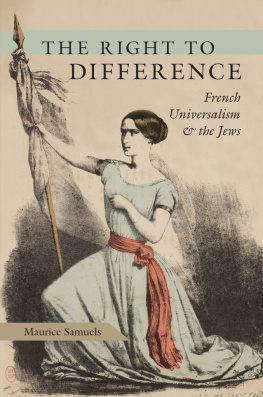

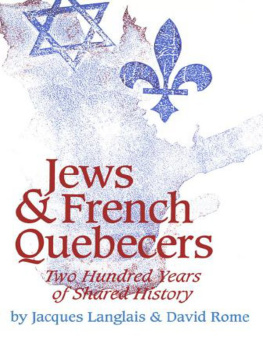
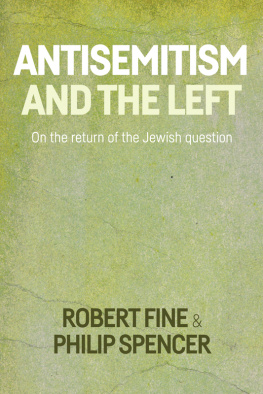
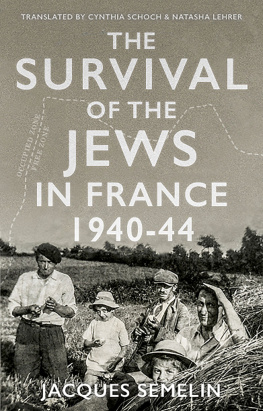
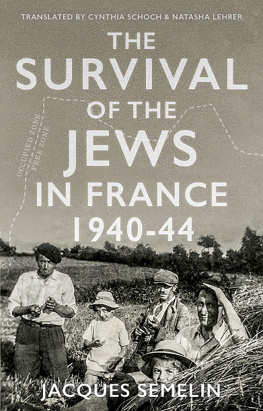
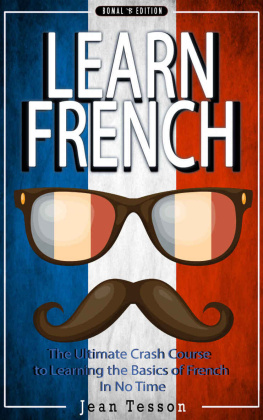
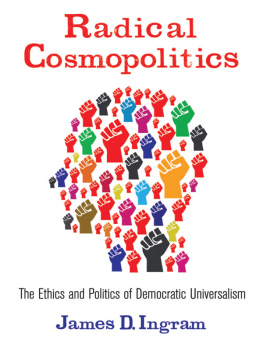
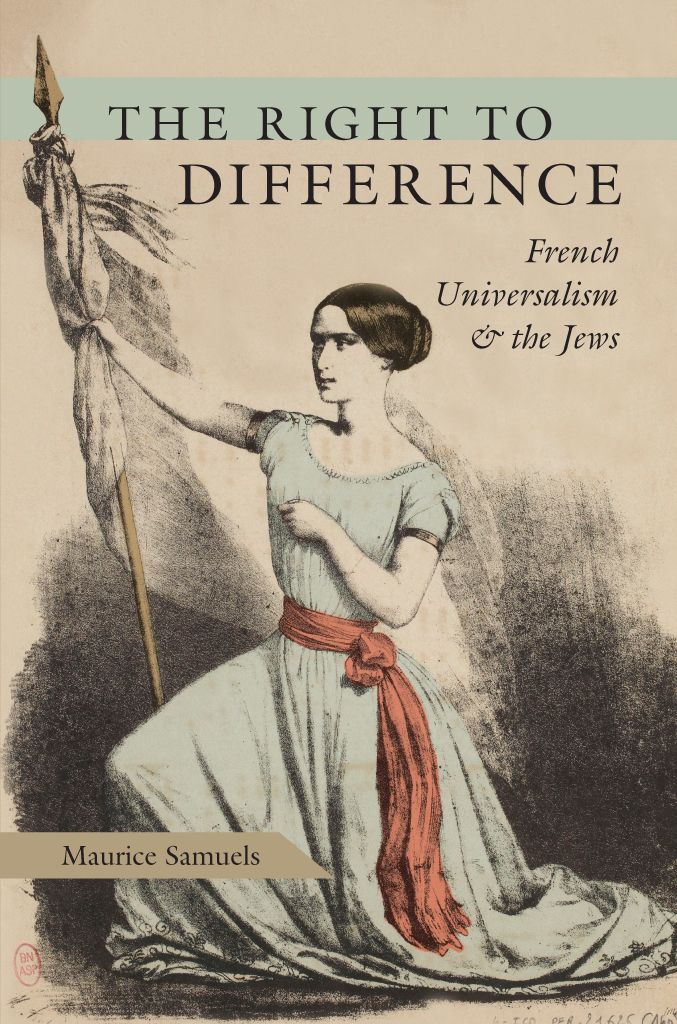
 This paper meets the requirements of ANSI / NISO Z 39.48-1992 (Permanence of Paper).
This paper meets the requirements of ANSI / NISO Z 39.48-1992 (Permanence of Paper).